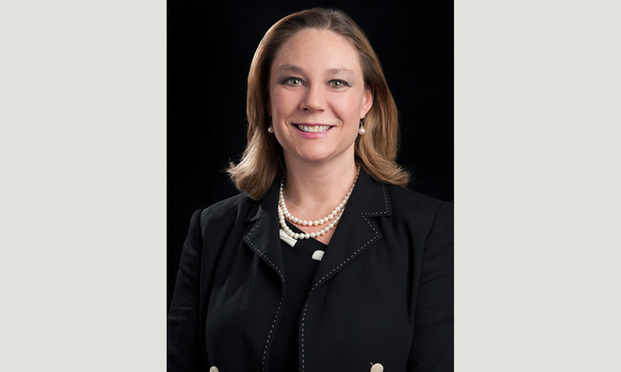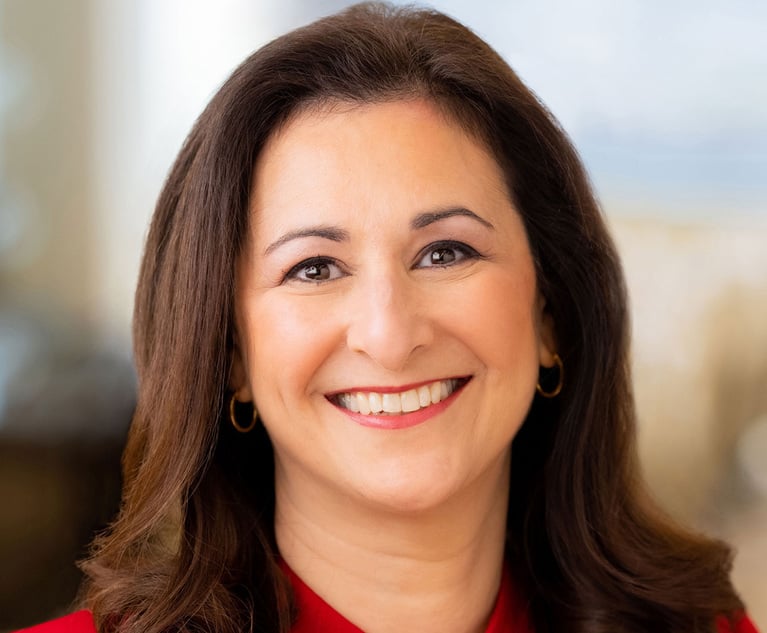The Custody and Support Challenges of COVID-19
All areas of legal practice have been impacted by COVID-19 closures and restrictions. However, the high emotions and challenging relationship dynamics involved in family law cases add another layer of difficulty to an already unprecedented time in the courts.
July 30, 2020 at 11:17 AM
6 minute read
 Stephanie L. Jablon of Pollock Begg.
Stephanie L. Jablon of Pollock Begg.All areas of legal practice have been impacted by COVID-19 closures and restrictions. However, the high emotions and challenging relationship dynamics involved in family law cases add another layer of difficulty to an already unprecedented time in the courts.
Parents were tasked almost overnight with working from home and home educating children. The added stress of the pandemic coupled with uncertainty about how everyday life and their legal cases would proceed intensified stress for families that already were unraveling. Separated and divorced parents are now handling shared custody when routines are out the window.
For families with support agreements, financial situations may have changed, possibly drastically. Existing support and custody orders must be followed, but what if they cannot be? Family law attorneys must remain adaptable, flexible and available to help clients navigate this new normal, both at home and in the courts.
In the custody arena, a myriad of challenges arose. On one hand, some parents flatly refused to transfer custody to the other parent, taking the position they were self-quarantining and the stay-at-home order meant stay at home. Let's face it, without COVID-19, there are parents who simply want to withhold their kids from the other parent. Sadly, there were cases in which a parent used the pandemic to keep the children from the other parent, because they believed there was now an "excuse" for them to do so.
Pennsylvania's stay-at-home order, however, included a carve out by Gov. Tom Wolf that permitted travel to exchange custody and for the purpose of adhering to orders of court. During the pandemic, there were many emergency motions and proceedings to enforce custody orders. In my experience, the custody orders were enforced by the court during the pandemic. Staying at home was not meant to keep the child at home from another parent. The child can stay at home with the other parent, at the other parent's house, as well.
This is in no way to minimize real concern and fear over passing COVID-19 from person to person. Many families faced legitimate concerns and high-risk situations related to COVID-19. Some families had a parent who is a health care worker, causing legitimate concern from the other parent. Even in the best of communicative co-parenting relationships, quarantining the rest of the family from a health care worker parent was sometimes required.
Situations arose in which one parent became aware of the other parent failing to abide by social distancing guidelines. Saying these parents were not taking social distancing seriously was an understatement as people came and went freely from the home without wearing masks. Not all custody cases involved an attempt at withholding due to self-serving, self-help.
On the flip side, there were some high-conflict custody cases in which parents worked seamlessly together during the pandemic. There were cases involving a parent who typically works outside of the home having the opportunity to stay home and engage with the children during times when that parent would typically be at work. Becoming a teacher overnight was simultaneously challenging, exciting, fun and stressful for parents and a big adjustment for all the children hightailed into homeschooling as well. Experiencing the daytime caretaking and parenting responsibilities was an eye-opener to some parents. In a few cases, there was a sense of understanding and appreciation of the primary custodian by the partial custodian that was lacking previously.
In other cases, parents commenced sharing time equally because neither parent was working outside of the home. With school closed, activities cancelled and the world shut down, a smoother schedule could ensue between two parents for a period of time.
For some, the restrictions of the stay-at-home order eliminated the choppy days of pre-COVID 19 hectic schedules and facilitated a focus on parenting with fewer distractions. For others, the challenge of meeting work deadlines and adapting to working in the home was tough. Some employees were dealing with navigating new technologies for work and were catapulted out of their comfort zone in that regard. Sometimes meeting those employment responsibilities while handling homeschooling, housework, cooking, caring for kids and pets and preserving mental health was overwhelming.
The pandemic left quite a distressing mark on individuals financially. Support obligations were difficult to meet in many instances. The recipients of support also were at a loss not knowing if their support would continue. There were contempt issues, as some parties failed to pay support, despite maintaining their income.
If there were modifications filed due to loss of income, it was difficult to assess the duration of the loss of income. Would the payor be returning to work and, if so, at the same income as before? If you file a modification and it is implemented, how quickly would you be turning around for another modification when some semblance of normalcy returned? The route you would take is case specific depending on the employment status. Decisions about how to proceed had to be made with whatever information was available concerning the duration of the loss of income. In many places of employment, it was difficult to discern how dire financial loss would be, and for how long. There were attempts to modify financial situations within an agreement, even though the financial loss was temporary. In many cases, the payor would have received unemployment or returned to work and, once again, have the ability to pay by the time the case was scheduled for court. Some situations resulted in long-term loss and certainly indicated action be taken in some manner.
COVID-19 most certainly turned the world as we know it upside down in many ways. A silver lining to the stay-at-home period was quality time with family—something that can be difficult to come by with today's packed schedules. An appreciation was sparked in many that may have been dimmed. As it has been said, growth comes from difficult times. Although we were all in this together, each person has different struggles and different strengths. I wish all health, safety and a hopeful silver lining in your experience throughout the pandemic.
Stephanie L. Jablon is a partner with Pittsburgh family law firm Pollock Begg. Contact her at [email protected].
This content has been archived. It is available through our partners, LexisNexis® and Bloomberg Law.
To view this content, please continue to their sites.
Not a Lexis Subscriber?
Subscribe Now
Not a Bloomberg Law Subscriber?
Subscribe Now
NOT FOR REPRINT
© 2025 ALM Global, LLC, All Rights Reserved. Request academic re-use from www.copyright.com. All other uses, submit a request to [email protected]. For more information visit Asset & Logo Licensing.
You Might Like
View All
Lackawanna County Lawyer Fails to Shake Legal Mal Claims Over Sex With Client
3 minute read

Conversation Catalyst: Transforming Professional Advancement Through Strategic Dialogue
5 minute readTrending Stories
- 1Rejuvenation of a Sharp Employer Non-Compete Tool: Delaware Supreme Court Reinvigorates the Employee Choice Doctrine
- 2Mastering Litigation in New York’s Commercial Division Part V, Leave It to the Experts: Expert Discovery in the New York Commercial Division
- 3GOP-Led SEC Tightens Control Over Enforcement Investigations, Lawyers Say
- 4Transgender Care Fight Targets More Adults as Georgia, Other States Weigh Laws
- 5Roundup Special Master's Report Recommends Lead Counsel Get $0 in Common Benefit Fees
Who Got The Work
J. Brugh Lower of Gibbons has entered an appearance for industrial equipment supplier Devco Corporation in a pending trademark infringement lawsuit. The suit, accusing the defendant of selling knock-off Graco products, was filed Dec. 18 in New Jersey District Court by Rivkin Radler on behalf of Graco Inc. and Graco Minnesota. The case, assigned to U.S. District Judge Zahid N. Quraishi, is 3:24-cv-11294, Graco Inc. et al v. Devco Corporation.
Who Got The Work
Rebecca Maller-Stein and Kent A. Yalowitz of Arnold & Porter Kaye Scholer have entered their appearances for Hanaco Venture Capital and its executives, Lior Prosor and David Frankel, in a pending securities lawsuit. The action, filed on Dec. 24 in New York Southern District Court by Zell, Aron & Co. on behalf of Goldeneye Advisors, accuses the defendants of negligently and fraudulently managing the plaintiff's $1 million investment. The case, assigned to U.S. District Judge Vernon S. Broderick, is 1:24-cv-09918, Goldeneye Advisors, LLC v. Hanaco Venture Capital, Ltd. et al.
Who Got The Work
Attorneys from A&O Shearman has stepped in as defense counsel for Toronto-Dominion Bank and other defendants in a pending securities class action. The suit, filed Dec. 11 in New York Southern District Court by Bleichmar Fonti & Auld, accuses the defendants of concealing the bank's 'pervasive' deficiencies in regards to its compliance with the Bank Secrecy Act and the quality of its anti-money laundering controls. The case, assigned to U.S. District Judge Arun Subramanian, is 1:24-cv-09445, Gonzalez v. The Toronto-Dominion Bank et al.
Who Got The Work
Crown Castle International, a Pennsylvania company providing shared communications infrastructure, has turned to Luke D. Wolf of Gordon Rees Scully Mansukhani to fend off a pending breach-of-contract lawsuit. The court action, filed Nov. 25 in Michigan Eastern District Court by Hooper Hathaway PC on behalf of The Town Residences LLC, accuses Crown Castle of failing to transfer approximately $30,000 in utility payments from T-Mobile in breach of a roof-top lease and assignment agreement. The case, assigned to U.S. District Judge Susan K. Declercq, is 2:24-cv-13131, The Town Residences LLC v. T-Mobile US, Inc. et al.
Who Got The Work
Wilfred P. Coronato and Daniel M. Schwartz of McCarter & English have stepped in as defense counsel to Electrolux Home Products Inc. in a pending product liability lawsuit. The court action, filed Nov. 26 in New York Eastern District Court by Poulos Lopiccolo PC and Nagel Rice LLP on behalf of David Stern, alleges that the defendant's refrigerators’ drawers and shelving repeatedly break and fall apart within months after purchase. The case, assigned to U.S. District Judge Joan M. Azrack, is 2:24-cv-08204, Stern v. Electrolux Home Products, Inc.
Featured Firms
Law Offices of Gary Martin Hays & Associates, P.C.
(470) 294-1674
Law Offices of Mark E. Salomone
(857) 444-6468
Smith & Hassler
(713) 739-1250






